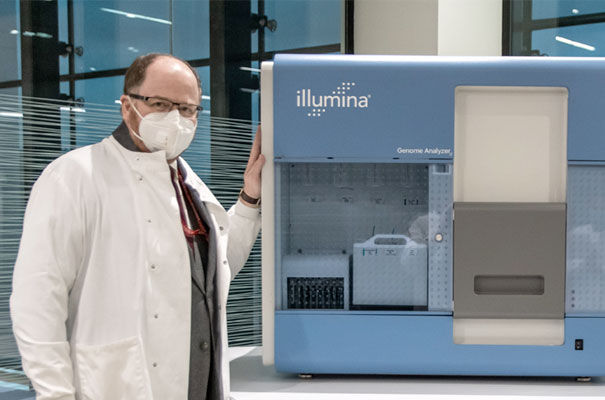Genomics powerhouse Illumina and Cambridge Biomedical Campus (CBC) gave Science & Innovation Minister George Freeman a masterclass in how Cambridge is leading innovation in life sciences.
Freeman was able to reflect on the historical journey of the advances in sequencing technology. As well as being the hub for UK life sciences, the Illumina Centre is the company’s EMEA headquarters and home to over 500 employees.
The Minister received a guided tour of Illumina’s Solutions Lab to observe the Next-Generation Sequencing technology that is unlocking the power of the genome and helping to improve human health across the world.
He also had the opportunity to hear about the Illumina Accelerator – the world’s first business accelerator focused solely on creating an innovation ecosystem for the genomics industry.
Clare Kingsley, senior director of Scientific Research at Illumina, said: “As a long-time advocate for Life Sciences in the UK, it was a pleasure to host Minister Freeman at our Illumina headquarters in Cambridge and reflect on the journey from the 100,000 Genome Project to present.
“The advances in sequencing technology at Illumina have significantly reduced both the time and cost of delivering genomics into healthcare for the NHS patients today.”
Bobby Kaura, director of Global Ecosystem Development, Illumina, added: “Improving healthcare outcomes by unlocking the power of the genome is a journey we take with our entrepreneurs, who demonstrate the actionability, depth and breadth of genomics applications.
“The visit from Minister Freeman, a long-time advocate for Life Sciences in the UK, sends a very strong signal of support and commitment to continue our investments in science and innovation, to drive value for Illumina Accelerator Cambridge startups.”
Freeman expressed himself mightily impressed, saying: “During my lifetime in and around Cambridge I’ve seen the Cambridge science and technology cluster grow into a global powerhouse of innovation in biomedical and digital technologies.
“As UK Science and Innovation Minister, my core mission is to ensure we continue to support this cluster with continued investment in great science and infrastructure for better connectivity to spread opportunities across the Eastern region and learn the lessons from Cambridge to help grow the other emerging clusters around the whole of the UK.
“Bringing the kind of hi-tech jobs and economic prosperity Cambridge has enjoyed to other parts of the UK is key to our Levelling Up commitment, and thanks to the work being done here we have an excellent blueprint to put the infrastructure in place to make that happen. Cambridge has shown what’s possible.”
The Biomedical Campus visit followed the site’s delegation among Life Sciences Opportunity Zones and allowed the Minister to learn how Cambridge is home to one of the strongest health and life science clusters dedicated to improving people’s lives. The visit involved tours of organisations across the CBC including:-
• The Genomics Laboratory Hub at Cambridge University Hospitals NHS Foundation Trust to meet Dr Sarah Bowdin, Professor Sharon Peacock and chief executive Roland Sinker to hear of provision of the national genomic test directories for rare disease and cancer.
• The MRC Laboratory of Molecular Biology for a discussion with the Director, Jan Löwe and his colleagues Madeline Lancaster and Chris Russo to see and learn about how advances in molecular understanding will change the future face of medicine particularly in relation to diseases of the brain.
• The Jeffrey Cheah Biomedical Centre for a visit to the Milner Therapeutics Institute to meet Tony Kouzarides and Kathryn Chapman and then Jason Mellad from Start Codon to witness first-hand the success of their model for academic-industry collaborations, acceleration of spin-out companies, and role in the University Connect: Health Tech online community networking platform.
• The Heart and Lung Research Institute – a joint venture between Royal Papworth Hospital (RPH) and the University of Cambridge that will create, test and deliver treatments to tackle the biggest causes of premature death in the world – with Stephen Posey, RPH Chief Executive, John Wallwork, RPH Chair, and University colleagues to learn how the organisations are working together with commercial partners to advance healthcare.
The Minister also heard how over 20,000 staff get to and from work having travelled to the campus from Cambridge Railway station via Whippet’s Universal Guided Bus, the plans for the campus in the future and the areas where investment can make a difference in the years ahead.
George Freeman added: “As we move the UK from a service economy to an innovation economy I look forward to continuing our work with researchers and businesses here to help innovative companies in Cambridge go from strength to strength, while growing similar clusters across the UK.”
Kristin-Anne Rutter, executive director at CBC Ltd said: “It was fantastic to welcome George Freeman to the Cambridge Biomedical Campus to demonstrate how those of us working in life sciences across the city are a strong, cohesive and joined up team whose simple mission is to improve lives.
“We showed the Minister how breakthrough discoveries are being made in Cambridge to understand the underlying mechanisms of disease, these then lead to new treatments and improved systems for care delivery. The value of the innovation in Cambridge, goes beyond our region, out to real world populations to prevent disease and repair bodies and minds.
“We know to succeed we need to continue to work across the city to unite the science parks, businesses and institutions to ensure the skills, talent and expertise we have is channelled effectively.
“We also have to ensure we bring ‘Cambridge’ as a whole with us. This means helping to tackle the health inequality we see, provide opportunities for young people from across the region to develop careers in the sector and ensure we work with our communities as we move forward. There is much to be done but we are confident we are heading in the right direction.”

